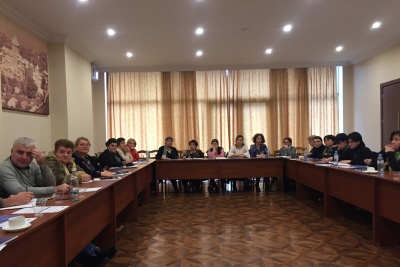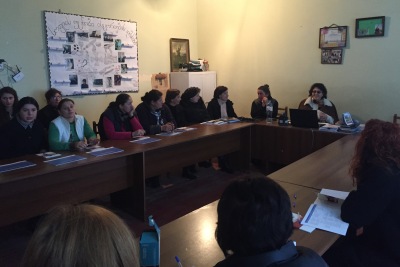Regional consultations ensure inclusion of conflict-affected women’s perspective in draft National Action Plan on Women, Peace and Security
Date:
Series of consultations were held with IDP and conflict-affected women, civil society organizations and local government in western Georgia, Samegrelo and Imereti regions regarding the development of the third phase of the National Action Plan on Women, Peace and Security.

The inclusion of civil society, particularly conflict-affected and IDP women and girls, has become a major priority in the development process of the NAP, supported by UN Women.
To better reflect the needs of conflict-affected and IDP women in this policy document, consultative meetings were held with the women and girls living in the villages adjacent to the Administrative Boundary Lines - Anaklia, Ganmukhuri, Khurcha and Perevi – by the Assistant to the Prime Minister on Human Rights and Gender Equality Issues, Ms. Sopio Japaridze,who leads the Inter-Agency Commission on Gender Equality, Violence against Women and Domestic Violence. In addition to human security-related issues, women shared the health-care and socioeconomic challenges they face on a daily basis. “Empowering rural women in local level decision-making and supporting women’s economic activities will resolve numerous problems we are struggling with today,” noted Perevi resident Eka Gogatashvili.
As part of these grass-roots consultation meetings, two civil society forums were held in Zugdidi and Kutaisi; key NGOs working in the conflict-affected regions were consulted for their input to the draft NAP.

Another objective of the visit was advocacy for the localization of the NAP and discussing the mechanisms for improved coordination between the central government and regional self-governance bodies for its implementation. Thus, meetings were held with the local municipality representatives in Zugdidi and Sachkhere to further identify their role in the development and implementation process of the NAP in partnership with civil society organizations and municipal gender equality councils.
According to Ms. Japaridze, information obtained during the meetings was highly valuable and will be translated into concrete activities to be implemented by the respective state agencies under the new NAP.
Covering the period from 2018 to 2020, the NAP constitutes the policy instrument prescribing the consolidated and coordinated actions required to address the needs of the conflict-affected population as well as to apply the principles of UNSCR 1325 et al. in driving institutional changes in the security sector, peace operations, mediation, negotiation and conflict resolution.